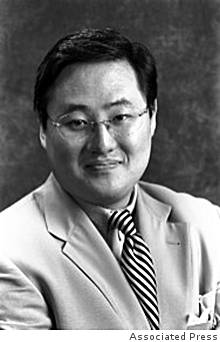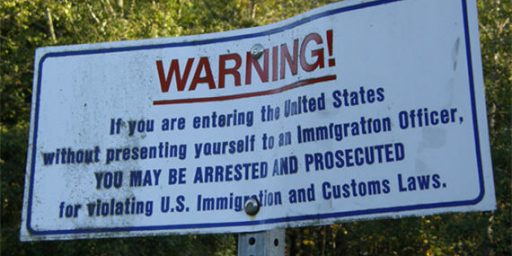White House: Dismiss John Yoo Lawsuit
 The Obama administration is fighting to dismiss Jose Padilla’s lawsuit against John Yoo, citing executive privilege.
The Obama administration is fighting to dismiss Jose Padilla’s lawsuit against John Yoo, citing executive privilege.
The Obama administration has asked an appeals court to dismiss a lawsuit accusing former Bush administration attorney John Yoo of authorizing the torture of a terrorism suspect, saying federal law does not allow damage claims against lawyers who advise the president on national security issues.
Such lawsuits ask courts to second-guess presidential decisions and pose “the risk of deterring full and frank advice regarding the military’s detention and treatment of those determined to be enemies during an armed conflict,” Justice Department lawyers said Thursday in arguments to the Ninth U.S. Circuit Court of Appeals in San Francisco.
Other sanctions are available for government lawyers who commit misconduct, the department said. It noted that its Office of Professional Responsibility has been investigating Yoo’s advice to former President George W. Bush since 2004 and has the power to recommend professional discipline or even criminal prosecution.
The office has not made its conclusions public. However, The [San Francisco] Chronicle and other media reported in May that the office will recommend that Yoo be referred to the bar association for possible discipline, but that he not be prosecuted.
What more could you ask for, really?
This isn’t the least bit surprising, of course. Indeed, it would be shocking if the administration sided against its own power and interests in a case.
Beyond the rational cited by DOJ, I’m actually persuaded by Yoo attorney Miguel Estrada’s argument that it threatens to “open the floodgates to politically motivated lawsuits” against government officials. To the extent that Padilla has grounds to recover damages caused by Yoo’s advice being carried out, it’s the United States Government that’s liable, not an individual employee. Even if Yoo’s strained legal analysis crossed the line into malfeasance, the advice was given to higher ups in the government and either relied upon or not. It’s therefore an institutional failure.





If I’m reading this correctly, these are the same rationales used by the DOJ when they tried to dismiss the case last summer, but then DOJ was representing Yoo. DOJ has withdrawn (but is still footing Yoo’s bill) and now has filed a motion on behalf of the Executive branch. The words are different (Yoo sought qualified immunity and invoked judicial abstention; Obama is citing executive privilege) and perhaps the result will be too.
Are you really arguing that government officials who violate the rights of citizens in the performance of their job should be immune from suit because they have a boss who could say no? Let’s be clear – Yoo advocated torture in his official capacity. Yoo was not in a position to personally carry out the acts, but this is as close as he could have gotten without getting a different job. Leaving aside the legal distinctions involved in absolute immunity and the exceptions thereto, if this isn’t a clear-cut case in which there should be an exception (and an official should be personally liable), I cannot think of one.
Immune from private lawsuit, yes. Padilla should be allow to sue DOJ in this case, not Yoo.
Having now sped-read the DOJ filing, I now see that the argument is more about Congressional supremacy and an objection to the courts creating a remedy without Congressional authorization:
The allegations against Yoo are that he was one of those forming the policies used upon Padilla, and that he deliberately wrote “legal cover” memos to shield what was patently illegal conduct.
That seems eligible for Bivens relief.
The “flood of lawsuits” issue is a canard. One, the courts have no trouble dismissing merely political suits. (Compare the “birther” suits.) Two, the argument proves too much. Bivens is good law and allows the feds to be sued for constitutional violations. Has there been a “flood” of baseless suits since 1971? Are the courts impaired in their business?
The potential for personal liability is *supposed* to have a “chilling effect.” It’s supposed to make people think twice about breaking the law.
anderson, the Obama DOJ’s answer is that courts are expressly reluctant to expand Bivens suits to new areas, and should be doubly reluctant to imply a cause of action in matters that touch on war and national security.
This is partly because Padilla is seeking to litigate the nature the rights of non-citizen enemy combatants in a lawsuit in which the government is not a party. My personal read of footnote one of the amicus brief is that if the DOJ were required to take a position, they would view the constitutional rights of citizen/enemy combatants as “not clearly established.”
anderson, the Obama DOJ’s answer is that courts are expressly reluctant to expand Bivens suits to new areas, and should be doubly reluctant to imply a cause of action in matters that touch on war and national security.
The best response to those claims is the district court’s opinion denying (in large part) the motion to dismiss. Short version: there is no “expansion” of Bivens, and national security is not a license to violate the Constitution with impunity.
james-How then do we hold officials like Yoo accountable? What remedy do we have both as a country and as an injured individual? I find myself more concerned about OLC lawyers with free license than I do about a few more lawsuits. One can get people killed and lose lots of money, the other only loses money.
Steve
steve, what about the problem of defensive practice of law? Google the Gorelick Wall.
Seriously though, the Obama DOJ points out a few alternate remedies, such as criminal prosecution and professional sanctions. They also argue that habeas relief is available to question the fact and nature of their detention.